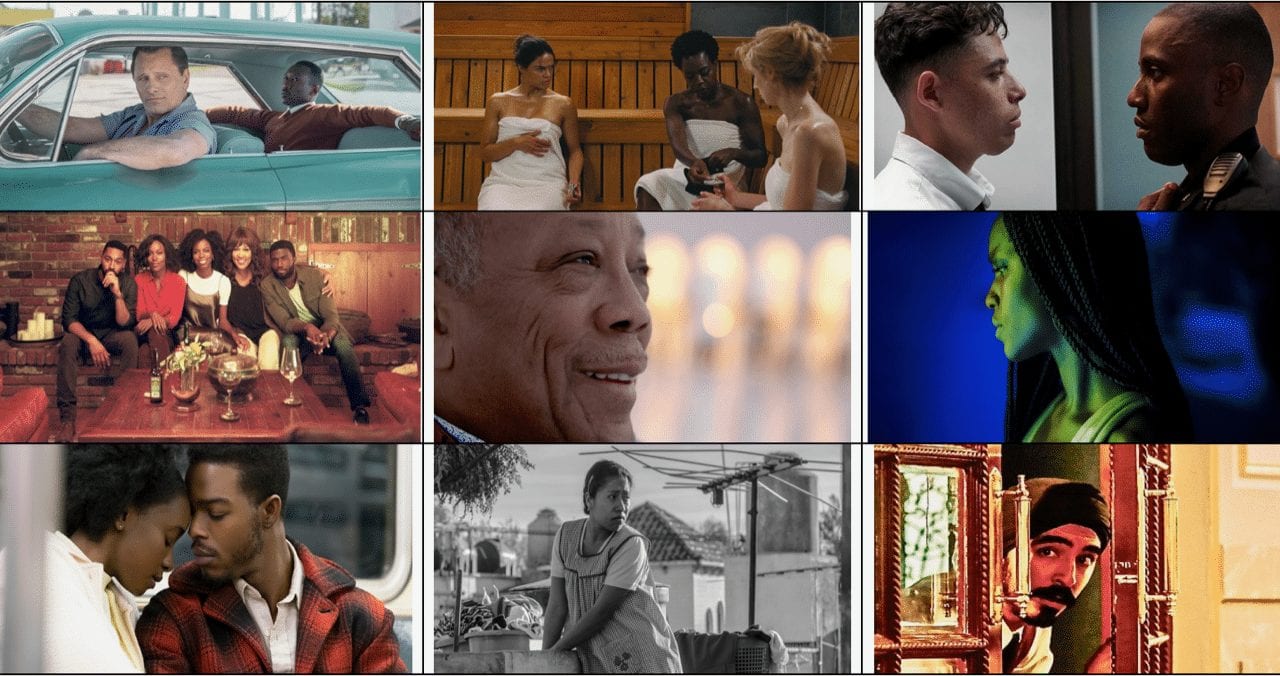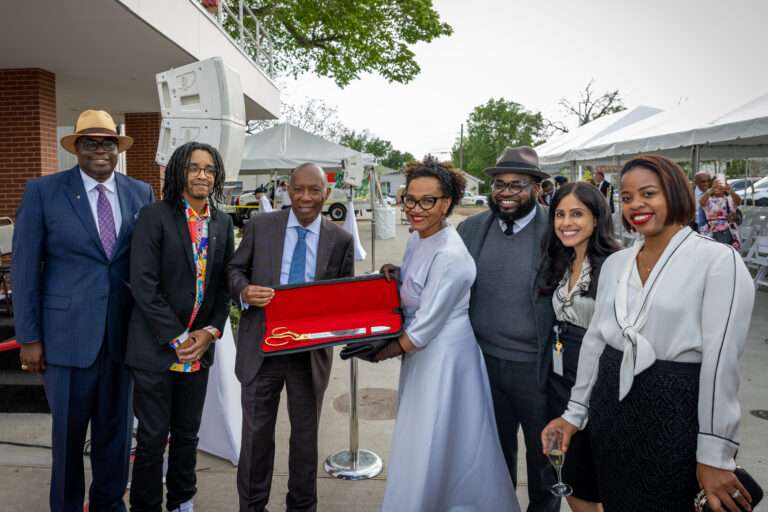by Dwight Brown NNPA News Wire Film Critic
Nearly 500,000 film lovers flocked to the 2018 Toronto International Film Festival screening over 250 films from 80 countries. Artistry and diversity, the hallmarks of TIFF, were on view.
Black artists, filmmakers and films were a key part of the soiree. Big budget movies, small indie films, documentaries and shorts filled out the innovative programming. Check out the best of the best and the most noteworthy.
BLACK FILMS & BLACK FILMMAKERS
Angel (***) This moody, gorgeously crafted portrait of two disparate souls who tryst with each other one fateful night, is a hypnotic ode to damaged people looking for a night of consoling. In Senegal, Fae (Fatou N’Diaye) is a tall willowy sex worker, as gorgeous as a super model. It’s no wonder the world-famous Belgian cyclist Thierry (Vincent Rottiers) is smitten by her. They meet, bond, go to a hotel for a rendezvous but only one survives the night. Writer/director Koen Mortier captures every alluring moment; gracefully paralleling the two lives, their very different careers and separate worlds. Special nod to cinematographer Nicolas Karakatsanis for the superb lighting and rich colors that make Senegal look magical.
Farming (*) Actor Adewale Akinnuoye-Agbaje (Trumbo, Suicide Squad) has a story to tell about his experience as a “farming” kid—a generation of African children in the ‘60s whose parents left their children with white working-class people in England as they sought better jobs or college educations. Becoming the foster child of a dimwit woman (Kate Beckinsale) doesn’t go so well for little Enitan; he’s emotionally abused. He grows up into an adolescent (Damson Idris) who is beaten and abused by white skinheads—until he becomes their leader. It’s not evident how much of this ordeal actually happened to Akinnuoye-Agbaje. And it doesn’t really matter, as anyone who sits through this misguided film will subject themselves to a litany of disgusting racist and sadistic incidents. Ill thought out art direction, set design and cinematography use pastel colors and bright flower prints as backdrops to the violent and disgusting events. Poor creative choices ruin a bio film that should have been enlightening. Casting Beckinsale as a blue-collar foster mom is just one of the gigantic stumbles.
Green Book (****) The Negro Motorist Green Book was the hotel travel guide African Americans used in the ‘30s to the ‘60s to find safe places to stay in the segregated South. The most unlikely director of all, Peter Farrelly (Dumb and Dumber) takes on this true-life tale about Tony Lipp (Viggo Mortensen), a bouncer at New York’s Copacabana nightclub in1962 who takes on a job as a driver for a Dr. Shirley. The racist rough-around-the-edges Italian-American brute thinks he will be working for a medical doctor. In fact, Dr. Don Shirley (Mahershala Ali, Moonlight) is a PhD, African-American classical pianist whose record company hires Tony to drive and protect the effete musician as he tours—especially south of the Mason Dixon line. The coupling of the two polar opposites (think The Odd Couple) is fascinating to watch. There isn’t a wasted second in this perfectly told, shot (Sean Porter), edited (Patrick J. Don Vito), scored (Kris Bowers) and directed drama/comedy. Mortensen strikes the right balance of Italian bravura and class clown. Robert DeNiro must be envious; this is the kind of role he’d eat for lunch. Linda Cardellini as Tony’s more accepting wife is pitch perfect. Mahershala Ali switches gears with ease from playing a hardened drug dealer in Moonlight to portraying a refined artist with great dignity and many secrets in this heart-warming crowd-pleaser. Expect Oscar nominations for the actors, director and screenplay. After all, Green Bookwon TIFF’s prestigious 2018 Grolsch People’s Choice Award, an award voted on by festival goers.
If Beale Street Could Talk (***) Unlike his film Moonlight, this Barry Jenkins screenplay, an adaptation of the James Baldwin novel, won’t be remembered for its innovative storyline. Instead, audiences will never forget the sumptuous cinematography (James Laxton), lush and atmospheric musical score (Nicholas Britell) and the evocative production design that impeccably set mood, tone and time period. Shrouded underneath the exemplary but heavy-weight production elements is an ever so slight love story about a young black couple (KiKi Layne and Stephan James) who endure racism, police malfeasance and wrongful incarceration in 1960s New York City. Regina King plays a concerned mom and turns in the performance of her career. Style over substance makes this film imperfect. The spirit of Baldwin’s book seems lost, except in one vibrant scene when the families of the couple meet and all hell breaks loose.
The Public (***) Emilio Estevez explores the plight of public libraries that have become community centers and refuges for the homeless. His script and direction turn a story about a sit-in by destitute people who have nowhere to go on a cold wintry Cincinnati night into a police stand-off with political ramifications. Estevez plays the head librarian who sticks up for the downtrodden; Jeffrey Wright portrays his boss, with Alec Baldwin as a negotiator and Christian Slater slithering around as a conniving politician. The plotline has a number of surprises that are quite touching. The likable ensemble cast also includes Michael K. Williams, Gabrielle Union, Richard T. Jones, Jena Malone and Jacob Vargas. Humorous, impactful and poignant. With a little extra tooling, would also make a great Broadway play.
Monsters and Men (**1/2) In this period of Black Lives Matter and police brutality, this trilogy of inner-city vignettes based around a police shooting in Bedford-Stuyvesant Brooklyn is timely and potentially enlightening. A white cop shoots a black man in front of a bodega. A Latin brother (Anthony Ramos) videotapes it on his smartphone. A black cop (John David Washington, BlacKkKlansman) is appalled but won’t risk his job to help nail the culprit. A high-school baseball prodigy (Kelvin Harrison Jr.) must decide between joining a civil rights demonstration and prepping for a tryout with baseball scouts. Reinaldo Marcus Green writes and directs the unraveling stories, never bringing any of the subplots to a fitting conclusion. Cinematographer Patrick Scola’s camerawork is the film’s greatest asset.
Quincy (***) Not many Bee bop era musicians are still alive to connect the dots between that art form and rap music. Quincy Jones is more than happy to do just that as he recollects his pioneering career in the music and entertainment industry. He starts with his childhood in Chicago in the ‘30s and ’40s, being abandoned by his schizophrenic mother, playing with Lionel Hampton as a teenager and a career-altering gig arranging an album for Dinah Washington. Then writing and arranging for Count Basie, Frank Sinatra and Michael Jackson, scoring films and winning Grammys become a part of his portfolio. The more personal side of his life is captured in interviews conducted over a three-year period as his daughter actress/writer Rashida Jones and filmmaker Alan Hicks chronicle Jones prepping, producing and directing the opening show for the National Museum of African American History & Culture in Washington, DC. Marriages, children, an aneurysm and drinking problem fill out the warts-and-all bio/doc. In so many ways, Quincy is an integral part of American history.
The Weekend (***1/2) Writer/director Stella Meghie, a Toronto homegirl, is a champ at creating biting comedies (Jean of the Joneses) and now she’s in the romantic comedy game with this impeccably told, dry-wit take on a triad that pits a tart-tongued comedienne (Sasheer Zamata, Saturday Night Live) against her ex-lover (Tone Bell) and his new girlfriend (DeWanda Wise). The three gather at her mom’s (Kym Whitley) bed & breakfast country inn in California. The dynamics intensify when a handsome hotel guest (Y’Lan Noel) flirts with the comic. Excellent ensemble acting. Under Meghie’s guidance the footage is always lively, awkward, funny and sardonic. Robi Botos’ musical score features R&B, Reggae and African rhythms that embody a pan-Africanism that is beguiling. This is the ultimate date movie, if you like making fun of your ex’s new lover. Sweet revenge brings hearts together Who knew?
Where Hands Touch (**1/2) Scoping out racial injustice and triumphs has become the specialty of British writer/director Amma Asante (Belle, United Kingdom). This time she sets her gaze on World War II Germany with a focus on a half-Senegalese half-German teenager (Amandla Stenberg, The Hunger Games, The Hate U Give) who is being protected by her white mother (Abbie Cornish, Geostorm) as Nazis round up Jews and people of color and take them to death camps. The girl falls in love with a young Nazi soldier (George MacKay) and his father (Christopher Eccelston) is appalled. Scenes look like overdone opera sets with lots of perfectly-dressed extras walking around. Never a grain of realism. Nice performances from cast. Film leads to a preposterous conclusion. It’s a fine concept, based on the little known fact that blacks were also rounded up by Hitler’s army. Pity, considering the filmmaker’s resume and the subject matter, this film should have been compelling.
Widows (**1/2) The very visually gifted director Steve McQueen has built a solid, quick-rising and award-winning career based on his talent and the shrewd project choices he makes from unique concepts. Hunger, Shame and 12 Years A Slave are all distinctive. Widows is not. It’s a low-concept story (Gillian Flynn, McQueen) about some widows (Viola Davis, Michelle Rodriguez, Elizabeth Debicki) whose husbands (Liam Neeson and others) are killed as they‘re committing a robbery. The sudden deaths leave their spouses in debt to other gangsters (Brian Tyree Henry, Daniel Kaluuya) or just plan destitute. And so, out of desperation, the women plot their own heist. Marginal plot. Nice direction, after all McQueen is genius. Yet the payoff for this slick production is no better than results you’d get from watching any ordinary crime-thriller. All-star cast goes through the motions leading up to a less than fulfilling ending. Passable, but most will expect better.
BLACK ARTISTS IN FILMS
Assassination Nation (***) It starts off like a cross between Mean Girls, Spring Break, Project X and The Purge. Decadent suburban teens, in Salem, of all places, act out (affairs with older men, teenage sex, drugs). All is well until a hacker decides to rip the scab off their debauchery and post photos of them on the web, after doing the same to the mayor and their high school principal (Colman Domingo). The female quartet (Odessa Young, Hari Nef, Suki Waterhouse and Abra) is blamed for the hacking. A mob mentality ensues and vigilante groups arm themselves and are ready to kill the witches. Filmmaker Sam Levinson has a good eye for adolescent rebellion, and combined with the demented violence, this study of New Age depravity could become a classic midnight movie. Quick edits (Ron Patene, editor) and split screen visuals (Marcel Rév, cinematographer) make the footage dazzling to watch. Ah, demented youth.
Beautiful Boy (**) Richard Pryor once said, “When drug use was a problem in the inner city, no one cared. Now it’s everyone’s problem.” In northern California, an adolescent son (Timothée Chalamet) is hooked on a host of drugs. His dad (Steve Carell), stepmom (Maura Tierny), mom (Amy Ryan) and siblings bear the brunt of his lying, expensive rehabs, relapses and stealing with tough love. The film is based on the best-selling memoirs of father and son David and Nic Sheff. Their books leave a roadmap for families going through the same challenges. This over-produced, Hollywoodish film fails miserably at bringing their harsh reality to life. Steve Carell’s limp performance fails to provide an anchor. Chalamet’s interpretation of a kid in trouble seems hollow. Director Felix Van Groeningen gives the film all the weight of a Pepsi commercial and nothing more. Big disappointment but a very worthy subject. Andre Royo (Empire) brings a touch of grit as the kid’s AA sponsor.
Carmine Street Guitars (***) A slice of New York’s earlier times is kept alive at the Carmine Street Guitar store where proprietor Rick Kelly has been building, fixing and selling guitars for decades to the likes of Bob Dylan, Lou Reed and Richie Havens. Surrounded by big expensive high-priced buildings, Kelly’s little shop is a relic and on its last legs. He builds his guitars from wood that is collected from around the city, often from buildings dating back to the 1800s (e.g. the famous Irish tavern McSorley’s bar, circa 1854). Kirk Douglas from The Roots, indie filmmaker Jim Jarmusch and Charlie Sexton from the Bob Dylan Band stop by to play guitars. Shot over one week, this charming doc grows on you gradually like a good morning cup of coffee or an after-dinner drink.
Destroyer (**1/2) As crime thrillers go, this take on an L.A. police detective who goes rogue to find and trap a cultish crime lord who killed her deceased partner, is decent. It’s directed by the very talented Asian American filmmaker Karyn Kusama (Girlfight), has a tight script by Phil Hay and Matt Manfredi and a strong supporting cast (Toby Kebbell, Tatiana Maslany and Shamier Anderson). Everything lines up well, except the miscasting of the lead character. Nicole Kidman is never believable as the drunken cop on a revenge spree. She tries to act tough, but can’t pull it off and wears an obtrusive wig that looks like possum roadkill. This is the kind of role Charlize Theron eats for breakfast after she drinks a cup of jet fuel.
High Life (**) Imagine a group of prisoners who are sent out to space in a ship, and one by one they die. Now cast Robert Pattinson, Juliette Binoche, Mia Goth, and André Benjamin in the leads and wait for sparks to fly. And wait. And wait. Veteran French director Claire Denis (Chocolat) marks her first English language film with a snore of sci-fi thriller that sucks the life out of you like a black hole. Cheap looking sets and costumes stop this odd, erotic space odyssey from reaching its final destination.
A Star Is Born (***) He’s (Bradley Cooper) a popular musician with problems, an alcohol addiction he can’t shake and a career that’s spiraling downward. She’s (Lady Gaga) his young protégé, a star about to be born. That plotline worked back in 1937, ’54 and ’76 and it holds up as actor Bradley Cooper modernizes it with his directorial debut. As Jackson Maine, a pop country singer, he projects a macho persona that will make audiences swoon. As Ally, a shy songwriter who needs a break, Lady Gaga will get viewers to love her character, too. Some will be surprised that Gaga can act. But the real shock is that Cooper can sing—and does it well. Very slick production, lush pop songs, nice romance. Cooper lets dramatic scenes languish or develop fully, depending on your point of view. Nice performances by the supporting cast (Dave Chappelle, Sam Elliott and Anthony Ramos). Somewhere inside this good 135-minute film is an even better 120-minute movie.
White Boy Rick (**) There are so many stories to tell about unfortunate people who get arrested and imprisoned for selling drugs. So why-oh-why did anyone think this real-life tale about a white 15-year-old drug dealer in 1980s Detroit was the one worth revealing? Rick (newcomer Richie Merritt) comes from an economically challenged Caucasian Michigan family (white trash). His sister is a junkie (Bel Powley), his dad is an illegal gun dealer (Matthew McConaughey) and he hangs out with some young soul brothers (RJ Cyler, Jonathan Majors) and sisters (Taylour Paige) who are caught up in gang life. Equally crooked FBI agents (Jennifer Jason Leigh, Rory Cochrane) and a local dirty detective (Brian Tyree Henry, If Beale Street Could Talk) blackmail the minor into becoming an informant. Loud ‘80s music can’t counter act a lethal blow of unsympathetic characters. Director Yann Demange (’71) gives the film style and pizzazz. But few audience members, rightfully, will care.







